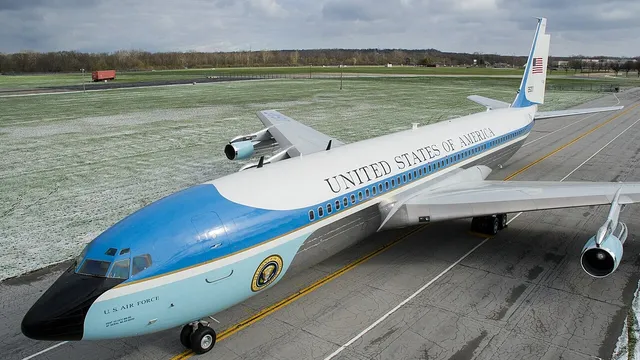
Trump's acceptance of Qatar's luxury plane sparks ethical concerns
2025-05-23 15:00- The Pentagon confirmed the acceptance of a luxury Boeing 747 from Qatar for use by President Donald Trump.
- Concerns have been raised about the legality and ethics of accepting foreign gifts, with critics questioning the security implications.
- Debate continues regarding the financial burden of retrofitting the aircraft, which could exceed $1 billion, raising doubts about taxpayer savings.
Express your sentiment!
Insights
In 2025, the Pentagon confirmed that Defense Secretary Pete Hegseth accepted a Boeing 747 from Qatar as a gift for President Donald Trump. This decision was made despite ongoing debates about the legality and ethics of accepting such a lavish gift from a foreign nation. Trump's administration argued that the plane would save taxpayer money by providing an alternative to the aging Air Force One, a claim that has faced bipartisan criticism in Congress. Critics, including several Republicans, expressed concerns over potential espionage and security issues associated with using a foreign aircraft for presidential transport. The issue of foreign gifts is regulated by the Constitution, which prohibits US officials from accepting presents from foreign entities without Congressional consent. Trump defended the acceptance of the plane, calling it a “great gesture” from Qatar and highlighting the potential cost savings. However, those opposed to the gift pointed out the substantial financial implications of retrofitting the aircraft to meet security standards, which could exceed $1 billion, questioning whether this truly benefits taxpayers or the legitimacy of presidential operations. Additionally, concerns were raised around the security and motivations behind Qatari intentions, with many lawmakers calling the decision a dangerous precedent. Some Republicans, along with Democrats, voiced their apprehension regarding the implications of such a gift, potentially suggesting hidden motives behind the gesture from Qatar, given the geopolitical relationships in the region. This ongoing debate strained relationships among parties while highlighting divisions in national security views and fiscal responsibility. In the aftermath of this decision, discussions surfaced about potential legislative measures to prevent future occurrences of foreign gifts to US officials, reiterating that accepting such gifts could undermine national dignity and integrity. As the Air Force began planning for modifications to the newly acquired aircraft, many remained skeptical about the long-term consequences of its acceptance, demonstrating the complexities involved in the intersection of foreign relations and domestic governance.
Contexts
The history of foreign gifts to U.S. presidents is a fascinating aspect of diplomatic and cultural relations. Gifts have been exchanged for centuries, serving as symbols of goodwill, friendship, and respect between nations. These gifts range from art pieces, traditional handicrafts, and luxury items to valuable artifacts, often reflecting the cultural heritage of the gifting country. For instance, Japanese Emperor Hirohito presented President Franklin D. Roosevelt with a specially crafted ceremonial sword during his presidency, signifying mutual respect and a strengthening of diplomatic ties following World War II. Such gestures have historically played a role in fostering international relations and can sometimes open doors to negotiations and discussions that have significant geopolitical implications. Over the years, the regulations governing these gifts have evolved to ensure transparency and prevent potential ethical conflicts. The Foreign Gifts and Decorations Act, enacted in the 1960s, set forth guidelines dictating how gifts to U.S. officials should be handled, establishing that gifts are to be reported and, in some cases, must be accepted by the U.S. government rather than by individuals. This legislation aimed to mitigate any potential influence gifts might have on political figures while promoting an ethical approach to foreign relations. Under the Act, gifts valued at over a certain amount must be reported to Congress, ensuring oversight and maintaining the integrity of the office. In the present day, the significance of foreign gifts remains, but the nature of these exchanges is continually impacted by global events and shifting diplomatic relationships. While some gifts are seen as tokens of goodwill, others have been scrutinized under ethical lenses, especially amid heightened concerns over foreign influence in domestic politics. Presidents and their administrations often face the challenge of navigating these gifts carefully, carefully considering public perception and the potential implications for U.S. foreign policy. The transparency in reporting these gifts serves not only to uphold the integrity of the presidency but also to reinforce the ethos of accountability within the government. The cultural implications of foreign gifts extend beyond mere tokenism; they provide a lens through which the values, traditions, and aspirations of a nation can be understood. For example, when Canadian Prime Minister Justin Trudeau gifted President Obama a hand-carved wooden totem pole in 2016, it was a powerful reminder of the shared cultural histories and the ongoing dialogue between the two nations. Such gifts highlight the power of cultural exchange in diplomacy, acting as bridges that foster understanding amidst differing political landscapes. In both historical and contemporary contexts, the legacy of foreign gifts to U.S. presidents is a testament to the intertwined narratives of politics, culture, and international relations that continue to shape global interactions.